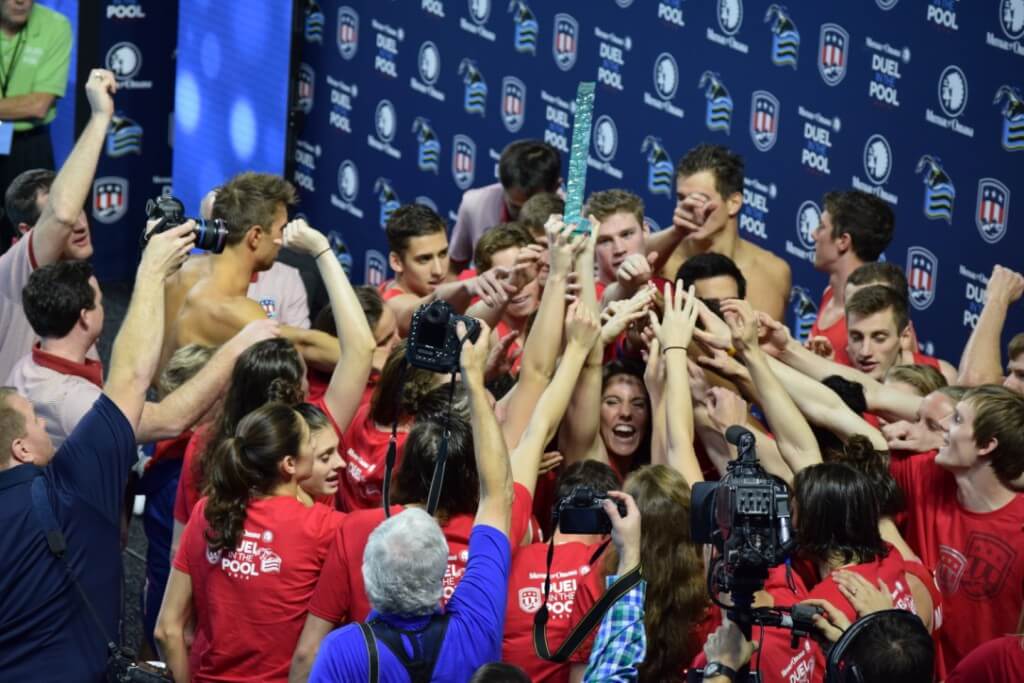The Special Culture of the Swim Team

The Special Culture of the Swim Team
As with so many other teams, swim team members are constantly together. I have heard so many people refer to us as “the swim cult,” “the swim family,” and swim team. In college, we tend to be roommates, we eat all meals together, and we hang out with each other outside the pool. The culture of the swim team runs deeper than just the pool.
1. Personal Moments
Swimmers face so many challenges with each other. We see each other every day, sometimes multiple times a day. We wake up early together and we compete together. Being together so often gives us the opportunity to see the best and worst in each other. Oftentimes we see every emotion from our teammates. These little moments of joy, sadness, and anger are important to us. They bring us closer, not only as teammates but also as friends.
2. Meal Times
At my school, at any point you can find a member of our team in the cafeteria. We always text each other when we are going and always like to eat together. Many swim teams have the “Swim team table.” This is where the team always sits and has their meals together. This is very important to swimmers because it is one of the few times we get to see each other outside the pool. We can see our true personalities outside of the water. So many fun conversations that do not pertain to swimming happen here and it is where we become more than just teammates. We talk about relationships, sports games, and about class.
3. Roommates
More often than not, swimmers room together. We do this because we share the same rigorous schedule and we do not have to worry about waking each other up or conflicting with each other. I find that having a fellow swimmer as my roommate motivates me to get to practice and work harder. This brings the team closer because we become a family unit outside of the pool. We support each other while we are not at home. It really helps because many teams have early morning practice or lifts, and we do not have to wake up someone who is not following that strict schedule.
4. Unity
Although swimming is an individual sport, the team becomes a family. It is so important for us to be on the same page. We push each other to do better and we always cheer each other on during our races. Swimmers care so much about each other; although we compete against each other, swimmers have a sense of family. We are genuinely friendly people who look for other swimmers to befriend. Swimmers from all teams have a sense of unity as a family. I feel like all swimmers understand the struggles of the sport and automatically understand the importance of respecting each other.
5. The Chlorine Smell
An overlooked thing about the culture of swimming is our natural scent. Swimming so much gifts us a constant scent of chlorine. We joke about this because we are so used to it, we find that we do not smell it anymore but others can smell it. I have friends who are not swimmers who always love to tell me that I smell like a pool. I think all swimmers at the end of the day find some comfort in the smell of the pool and sometimes laugh at the fact the pool follows them everywhere.
6. Language
“On the top!”;” taper season”; and “ dryland”: these may sound like words from a foreign language to those who do not swim. But swimmers know them like the backs of their hands. We have so many quick abbreviations, slang terms, and dialects that others may not understand. We are taught this early in our swimming career so we can quickly tell each other the set, when to go, and how we did. Swimmers find that we confuse non-swimmers with our terms; for example “dryland” means any exercise that is not in the water, such as lifting weights. “On the top” tells others when to start the next part of the set; it means on the double zero, or the top of the new minute.
The culture of swimming is hugely important to those who are part of the sport. Swimmers find comfort in knowing that we have so much in common with other swimmers. We find a sense of belonging and have an extra large chosen family. We know the importance of the sport and we embrace all the little things that come with it. Swimmers never sacrifice time with our teammates, and we strive to make each other better on all levels. From language to scents, swimmers have the most unique culture.
All commentaries are the opinion of the author and do not necessarily reflect the views of Swimming World Magazine nor its staff.



